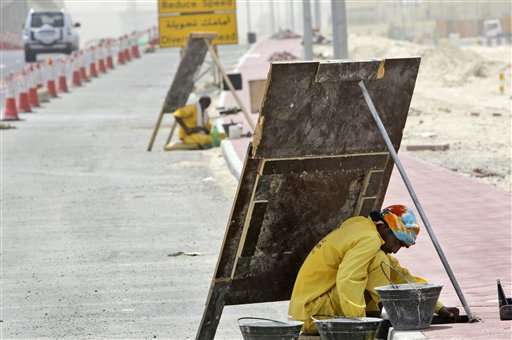An intolerable unimaginable heat forecast for Persian Gulf

If carbon dioxide emissions continue at their current pace, by the end of century parts of the Persian Gulf will sometimes be just too hot for the human body to tolerate, a new study says.
How hot? The heat index—which combines heat and humidity—may hit 165 to 170 degrees (74 to 77 Celsius) for at least six hours, according to numerous computer simulations in the new study. That's so hot that the human body can't get rid of heat. The elderly and ill are hurt most by current heart waves, but the future is expected to be so hot that healthy, fit people would be endangered, health experts say.
"You can go to a wet sauna and put the temperature up to 35 (Celsius or 95 degrees Fahrenheit) or so. You can bear it for a while, now think of that at an extended exposure" of six or more hours, said study co-author Elfatih Eltahir, an MIT environmental engineering professor.
While humans have been around, Earth has not seen that type of prolonged, oppressive combination of heat and humidity, Eltahir said. But with the unique geography and climate of the Persian Gulf and increased warming projected if heat-trapping gas emissions continue to rise at current rates, it will happen every decade or so by the end of the century, according to the study published Monday in the journal Nature Climate Change.
This would be the type of heat that would make deadly heat wave in Europe in 2003 that killed more than 70,000 people "look like a refreshing day or event," said study co-author Jeremy Pal of Loyola Marymount University
It would still be rare, and cities such as Abu Dhabi, Dubai and Doha wouldn't quite be uninhabitable, thanks to air conditioning. But for people living and working outside or those with no air conditioning, it would be intolerable, said Eltahir and Pal. While Mecca won't be quite as hot, the heat will likely still cause many deaths during the annual hajj pilgrimage, Eltahir said.
"Some of the scariest prospects from a changing clime involve conditions completely outside the range of human experience," Carnegie Institute for Science climate researcher Chris Field, who wasn't part of the study, wrote in an email. "If we don't limit climate change to avoid extreme heat or mugginess, the people in these regions will likely need to find other places to live."
Said Dr. Howard Frumkin, dean of the University of Washington school of public health, who wasn't part of the research: "When the ambient temperatures are extremely high, as projected in this paper, then exposed people can and do die. The implication s of this paper for the Gulf region are frightening."
But if the world limits future heat-trapping gas emissions—even close to the amount pledged recently by countries around the world ahead of climate talks later this year in Paris—that intolerable level of heat can be avoided, Eltahir said.
More information: Nature Climate Change, DOI: 10.1038/nclimate2833
Journal information: Nature Climate Change
© 2015 The Associated Press. All rights reserved.



















